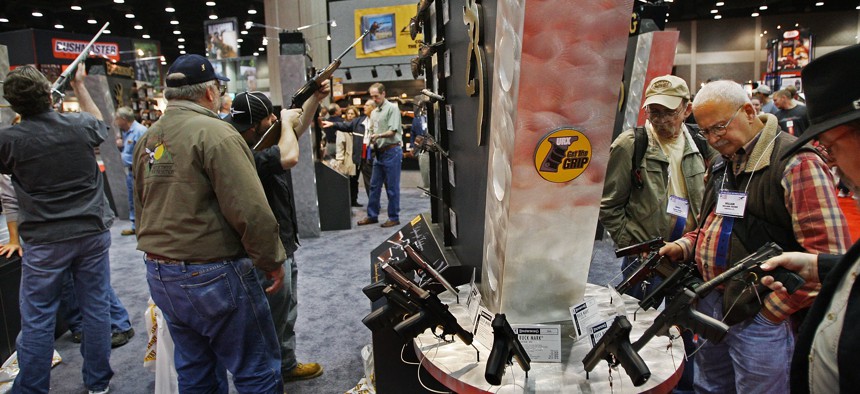Mayors urge ATF to finalize rules to expand background checks

Scott Olson via Getty Images
The proposed rules would close the “gun show loophole,” which is one of several loopholes that currently allows one-fifth of all the guns sold in the nation to be sold without background checks.
The nation’s mayors are urging the Bureau of Alcohol, Tobacco, Firearms and Explosives to approve proposed rules, called for by Congress in last year’s bipartisan gun legislation, that will require more people to pass a background check to buy guns online or at gun shows.
The rules, proposed this summer, would close what has become known as the “gun show loophole,” in which sellers at such events are subject to much looser federal regulations than those who sell out of bricks-and-mortar stores. The loophole has grown to include people who sell firearms online.
The U.S. Conference of Mayors in a letter earlier this month urged the ATF to finalize the rule and close one of several loopholes that currently allows one-fifth of all the guns sold in the nation to be sold without background checks.
While the proposed rules are opposed by gun rights groups like the National Rifle Association, Kansas City, Missouri, Mayor Quinton Lucas said “it’s just common sense” to close loopholes in the background check system.
“It just makes sense that we do all we can to make our communities safer. I think it is a no-brainer that we actually do the work necessary for Kansas citizens and Americans overall to make sure that those who are possessing firearms are safe,” Lucas, who is the chairman of the mayors’ Committee on Criminal and Social Justice, said in an interview.
The specific issue the ATF’s proposed rules are trying to address is a complicated one that revolves around what constitutes a dealer. Under federal law, only people who are “engaged in the business of selling firearms at wholesale or retail,” and who have the “principal objective of livelihood and profit,” have to have a license to sell a gun. People who buy guns from these sellers have to pass a background check.
Exempted from having to have a license are people who are not selling them to make money or a living. “Say I purchased a gun five years ago and decided I no longer want it,” said Adzi Vokhiwa, federal affairs director for the gun control group, Giffords. “I want to purchase another gun. I could sell it to my neighbor or someone in a classified ad.”
Under that scenario, Vokhiwa would not have to undergo a background check.
It used to be that guns were mostly bought from physical gun stores. But that has changed. In its proposed rules, the ATF noted that a “proliferation of new communications technologies and e-commerce has made it simple for persons to advertise and sell firearms to a large potential market at minimal cost and with minimal effort.”
In addition to guns being sold online, there has also been a “proliferation” of other ways people can sell guns, including at gun shows and flea markets, the ATF said.
“Now there are websites like Armslist [a classifieds website for firearms] and other online marketplaces like Craigslist, social media and Facebook marketplace,” Vokhiwa said. “People are connecting in all sorts of ways and all sorts of places to purchase guns.”
As a result, it’s become “ambiguous” to tell whether people selling guns in those ways are doing it as a “livelihood” and, as a result, requiring buyers from these sellers to pass background checks has not been enforced.
“That’s opened the door for people who intentionally want to evade the background check requirement to turn to unlicensed gun sellers,” Vokhiwa said. “We see this loophole being exploited for people who have bad intent.”
Last year, in the first major piece of gun legislation passed in more than 30 years, the then-Democratic Congress was able to reach an agreement with Republicans to close this loophole. Under the law, Congress said dealers would have to be licensed to sell guns in person or online if they “devote time, attention and labor” to try to make a profit, even though it is not their livelihood.
In the ATF’s proposed rules, people still do not have to have a license if they are giving away guns as “bona fide gifts” or if they occasionally sell firearms to get a better weapon for their “personal collection or hobby.”
To make the law clearer, the ATF's proposal gives a number of examples of when it will be presumed people are trying to make a profit. For example, they will need to have a license if they are repeatedly selling guns, advertising guns for sale on websites or renting space like a table at a gun show to display the guns they have for sale.
Vokhiwa, whose group is pushing to require background checks on all gun sales, said there are still a number of loopholes.
Guns, for example, can be sold if the FBI does not complete a background check within 72 hours. That is called the “Charleston loophole” because it allowed a white supremacist named Dylann Roof to buy a gun and then enter the Emanuel African Methodist Episcopal Church in Charleston, South Carolina, in 2015 and kill nine people.
“There are a lot of loopholes in the law,” she said. “I think there's a lot that we can do to strengthen the background check system. But this is a step in the right direction.”
Kery Murakami is a senior reporter for Route Fifty, covering Congress and federal policy. He can be reached at kmurakami@govexec.com. Follow @Kery_Murakami
NEXT STORY: Feds consider limiting how states can use welfare funds






